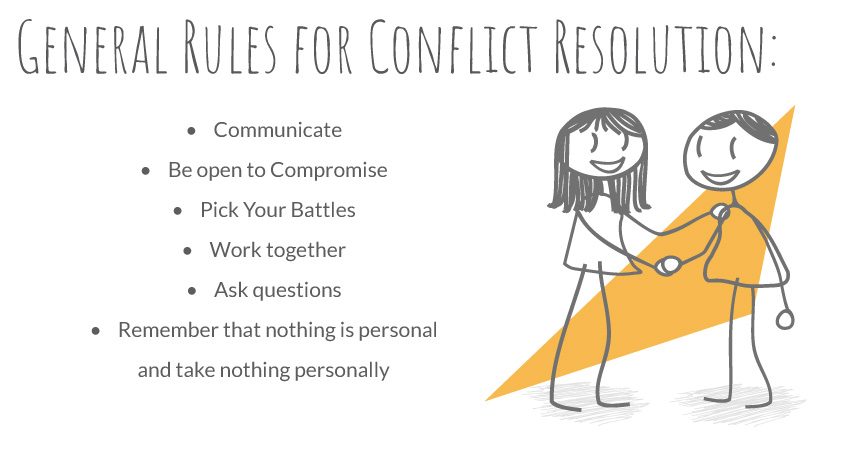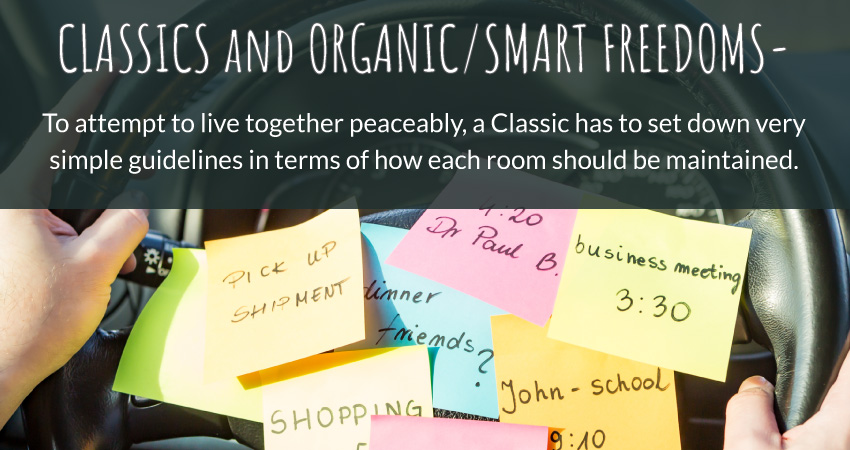What’s Your Problem? Classics and Conflict Resolution
At this point, you are probably aware of what your type is and the types of those you live with. (We hope you’ve considered what the possibilities are, at least.) There are several key things to remember when trying to get along with another type — and chances are, you live with one. We joke all the time about being marriage counselors as well as professional home organizers, but really, coming up with viable organizational solutions for couples who are different types is a large part of what we do.

Think about the things that you love about your partner. It might be their smile, or the way they smell, or their way of always being willing to run to the drugstore when you’ve run out of tampons. (Or not) There’s a big fat chance that the way they organize things and keep things clean (or cluttered) is not on your list of things you love about them. The types can have similarities, but all have different ways of seeing the world. They are personality types, after all. And each type has a specific logic to the way they do things — both inside the house and out. This extends to organizational and planning style as well, and can make for some particularly hairy situations when it comes to clashes. Luckily, we’re here to help sort out the issues between certain types and provide solutions to better mesh (and not clash) with your better (or less better) half.
- Communicate- Share your organizational plans, thoughts and ideas with your partner, spouse or roommate via lists or verbally. To Classics, these “thoughts” might actually be standards, but certain types could buck at that, so attempt to communicate as though it’s a dialogue and not a one-woman show.
- Be open to Compromise- This one is a biggie. Classics might want all clutter out of sight, but Freedoms need to see the clutter to remember where it is and why they have it. Compromise? CONTAIN the clutter in glass or transparent holders or bins. Perfect example of an easy compromise between two very different types.
- Pick Your Battles- If there are so many things that are ‘wrong’ you don’t know where to look, focus on one thing and calmly address it with your partner. If you can manage to do this with one thing, chances are you’ll be ok approaching other things too, but if the ‘wrongdoer’ in the situation is confronted with a litany of things to address or change about the way he/she does things, nothing positive will come of it.
- Work together- Make the other person feel like they are part of the solution by respectfully asking their advice and input on the issue.
- Before you throw anything away belonging to that person (be it chocolate or cheese or crumpled tissue), ask them about it. “Did you want to keep this?” is a perfectly fine way of checking in (and it’s not passive aggressive, unless you take on that tone, which we don’t advise).
- Remember that nothing is personal and take nothing personally. Because leaving a wet towel on the pristine floor of your bathroom (or previously pristine floor of your bathroom) is not an affront to YOU, it is merely the way the other person functions. As much as those acts seem to be purposeful acts of aggression, it helps to remember that they aren’t, not in the least.
Conflicts and Solutions for Classics and All Other Types
CLASSICS and CLASSICS-
Your problems, luckily, are few, since you both enjoy a similar zero clutter tolerance policy, and since tidiness is a top mutual priority. However, because you both create organizational rules ad nauseum, some of the rules are bound to be a bit different. In this case, follow our general rules of engagement listed above, and you should be fine.

The biggest issue between these two types is actually two issues: a) Fun’s inability to be on time to anything, ever and b) You want to organize everything and Funs only want to organize where their passion is (for example, the walk-in closet and shoe rack). The way to peace is to a) lie about what time the event actually begins in order to get the Fun there on time, and b) give them a containing system for papers and mail (which they are rarely passionate about). Otherwise, be specific with deadlines and share your organizational system ideas with them in transit rather than a big sit down meeting.

This duo is A-OK when it comes to prioritizing, being punctual, and getting things accomplished, but when it comes to clutter and keeping things Classically Tidy, watch out. They notice things much later than you do, meaning it will basically fall to you to keep things tidy and clean, unless you want a permanent fight (none of us do). If you provide a way to contain their clutter so that they can see it, they’ll adapt. Moreover, if you let them know how much their lack of insight when it comes to the dishes in the sink or the coats on the floor, etc. bothers you, they’ll make an attempt to change. Your honesty will appeal to their empathic side, and you might just get a clean kitchen out of it! Organic and Smart Structures will struggle with letting go of their stuff. Emphasize the idea of storage and Later Boxes, and see what happens.
These are opposites in terms of organizing and keeping things clean and tidy. A Classic must love his/her Organic or Smart Freedom madly in order to put up with his/her behaviors: clothes in clumps on the floor, unmade beds, dirty dishes, kitchen cupboard doors left open (this is a big pet peeve of a Classic type — and so are all the others) and refusing to make advance plans and accumulating clutter. To attempt to live together peaceably, a Classic has to set down very simple guidelines in terms of how each room should be maintained. Other than that, it’s pick your battles and compromise. Oh yes. And Acceptance. You love this person, right down to the inky to-do list on their hand.
